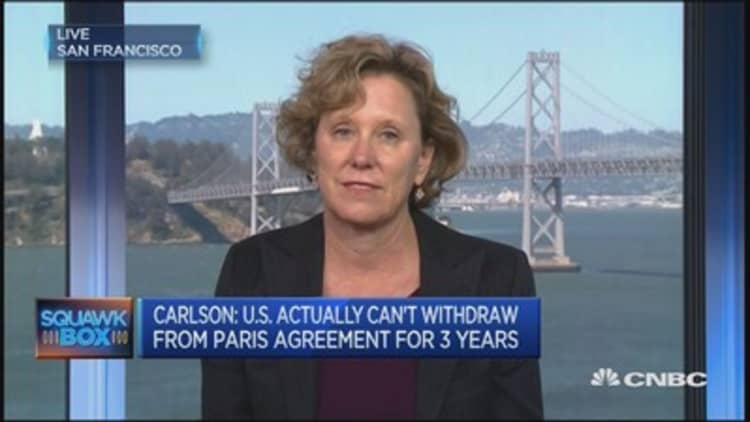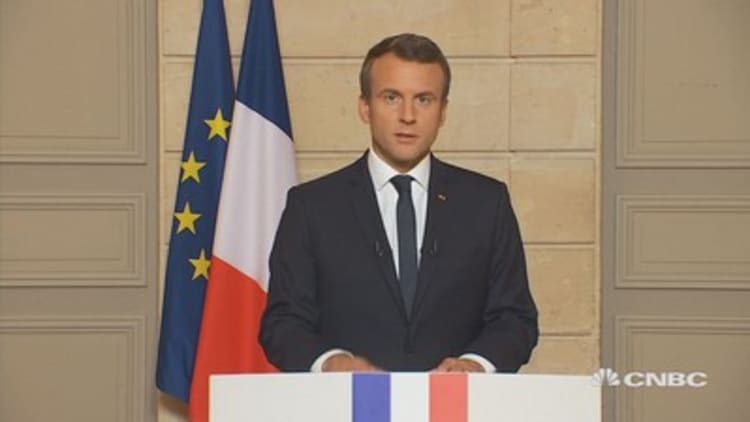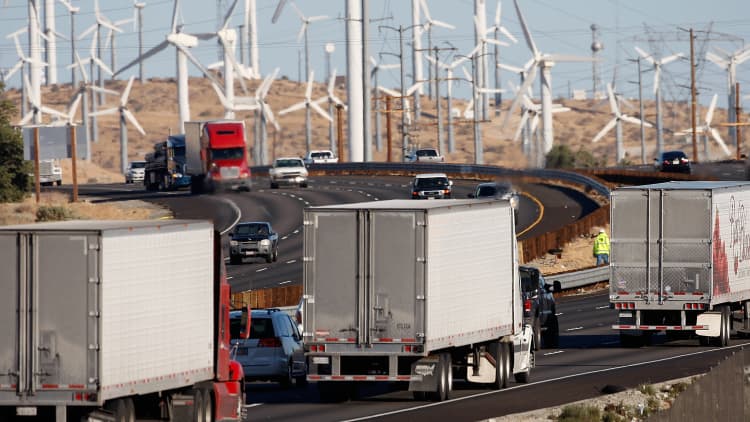


China could reap geopolitical and economic benefits following President Donald Trump's decision to abandon an international agreement on climate change.
In a heavily-teased event on Thursday, the president withdrew the U.S. from the Paris Agreement — a universal deal on tackling global warming — claiming the pact hurt American workers, businesses and domestic economic growth. Nearly every country in the world is a signatory of the deal and Trump's decision sparked outrage both at home and abroad.
The news holds significant political capital for the world's second-largest economy as it presents Chinese President Xi Jinping with a chance to boost his country's profile on the global stage.
"America's difficulties are China's opportunities," Greenpeace East Asia's senior global policy officer Li Shuo told CNBC.
The mainland has demonstrated some commitment to environmental reforms through efforts to tackle air pollution and decrease coal usage — national coal output fell 1.7 percent on-year in the first two months of 2017. Still, the carbon-heavy resource remains widely consumed, leaving the Asian giant as the world's largest single emitter of greenhouse gases.
But in the aftermath of Trump's decision, "there is no better time for China to further its climate leadership," Li said. "The country has moved from a climate bad boy at the 2009 Copenhagen climate summit, to a cautious leader in the run up to the Paris conference, and now to a country with potential to become a true climate leader in the age of Trump."
The episode has parallels to Trump's exit from the Trans-Pacific Partnership deal earlier this year, which saw China assert itself as a champion of international trade amid a U.S. absence.
Speaking on Thursday, Chinese Premier Li Keqiang said his country will stand by its Paris obligations, which include lowering the carbon dioxide intensity by 60 to 65 percent from 2005 levels by 2030. China and the European Union have already decided to forge ahead without Washington, according to a statement by EU climate commissioner Miguel Arias Cañete, and the issue is expected to feature prominently in Premier Li's discussions with EU officials on Friday.
Washington's retreat also holds potential economic advantages for Beijing.
"If U.S. policy shifts in favor of fossil fuels as opposed to renewable ones, in the long run China will gain the upper hand in the inevitable global move toward cleaner sources of energy," said Ann Carlson, professor of environmental law at the University of California, Los Angeles. "The withdrawal of the U.S. from the global community opens up more opportunities for China."
"The nations that remain in the Paris Agreement will be the nations that reap the benefits in jobs and industries created," former President Barack Obama said in a statement after Trump's announcement.
Trump is not legally obliged to follow his predecessor's pledge to cut greenhouse gas emissions to a third of 2005 levels by 2025, but on Thursday, he claimed the county would remain environmentally friendly.
Indeed, low natural gas prices are expected to support further U.S. emissions reductions, noted Randy Kroszner, economics professor at the University of Chicago and former Federal Reserve Governor. In fact, he added, Beijing is the one most in need of reform: "The key for world climate change is China."
For its part, Asia's largest economy is already taking steps to mitigate the impact Washington's exit from the Paris deal.
The EU and China are expected to announce intensified joint measures to reduce carbon emissions in a statement later on Friday, including developing more green technology and helping to raise $100 billion a year by 2020 to help poorer countries cut emissions, Reuters reported.
"China is already cutting emissions faster than predicted," noted Carlson.
Beijing's new diplomatic approach to environmental issues could also boost international efforts, said Li, noting how China's ambassador to the UN pledged in March to help bridge climate negotiations.
"This is a significant progress from the traditional approach of 'hide your capability and bide your time.' China now is invested in multilateral climate governance. Its leaders are taking ownership of this issue," Li said. "This is an area that Chinese political and economic efforts can partly offset America's retreat."

